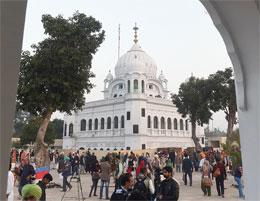University pays homage to Guru Nanak

Pakistan's Prime Minister Imran Khan this week laid the foundation stone for a university named after Baba Guru Nanak, the founder of the Sikh religion, ahead of his 550th birth anniversary next month.
The university will be set up in Nankana Sahib district of northeast Punjab province, the birthplace of Baba Guru Nanak, located 75 kilometres (46 miles) from the provincial capital, Lahore.
The development comes days after Pakistan and India signed an agreement for the opening of a key border crossing for Sikh pilgrims to attend the birth anniversary of their founder, despite heightened tensions between the two nuclear-armed rivals over Kashmir.
"Setting up of an educational institution is the best way to pay homage to Baba Guru Nanak because education is the key to nations' success," Khan said while addressing the ceremony.
In November last year, Islamabad and New Delhi agreed to open Kartarpur crossing that connects Pakistan's northeastern Narowal city to India's eastern Gurdaspur district.
Kartarpur Sahib Gurdwara, situated in Narowal - about 115km (71 miles) from Lahore - is one of the most revered temples for the Sikh community, as Baba Guru Nanak spent the last 18 years of his life there.
The distance between the temple and Gurdaspur is 3km (two miles) but the closure of the crossing forces Sikh pilgrims from India to travel hundreds of kilometres, via Amritsar and Lahore, to reach there.
Pakistan's northeastern Punjab province is home to some of the most important pilgrimage sites for Sikhs.
These include the birthplace of Baba Guru Nanak, who was born in 1469 in Nankana Sahib district, and Gurdwara (or monastery) Punja Sahib in Hasan Abdal town, where the handprint of Guru Nanak is believed to be imprinted on a boulder.
Guru Nanak (1469-1539) was one of the greatest religious innovators of all time and the founder of the Sikh religion.
Nanak's religious ideas draw on both Hindu and Islamic thought, but are far more than just a synthesis. Nanak was an original spiritual thinker and expressed his thoughts in extraordinary poetry that forms the basis of Sikh scripture.
The most famous teachings attributed to Guru Nanak are that there is only one God, and that all human beings can have direct access to God with no need of rituals or priests. His most radical social teachings denounced the caste system and taught that everyone is equal, regardless of caste or gender.






